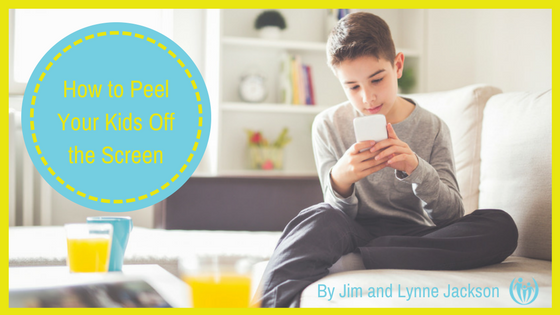
How to Peel Your Kids Off the Screen
It’s halfway through the summer, and you’re finding yourself in power struggles over screen time with your kids. Why can’t they simply obey you and get off the TV/video game/internet respectfully — when asked — with no whining, complaining, manipulating, negotiating, or otherwise driving you crazy? A reasonable question, but there are a couple of key complicating factors:
- You’re up against a giant. Your “foe” is a whole industry with incredibly brilliant designers, programmers, and marketers with billions of dollars competing in a race to “capture the eyeballs” of youth. In a famous statement at the height of MTV’s popularity, a spokesman said, “We don’t shoot for the 14-year-olds, we own them.”
- Your anxiety and anger is contagious. Because of how powerless parents feel against their children’s screen obsessions, the parents often head into the interaction full of anxiety (“Will my kid ever get a life, or will he just live in my basement playing video games forever?”) and anger (“Why can’t they just obey? I’m sick of this fight!”). If you are anxious, your kids sense it and in some shape or form it spreads to them. This dynamic can quickly spiral out of control.
So how can you overcome those factors to connect effectively with your child? Here are some “DOs and DON’Ts” for the battle of the screens:
- Don’t be passive. When we grow weary of fighting, the temptation is to throw in the towel. But if parents give up when limit-setting is tough, the message it sends to their child is “You’re not worth the effort to deal well with this.” Passivity solves nothing, and often leads to further disconnection between parents and their kids.
- Don’t demand “cheap control”. Sometimes parents put strong limits in place, but give little or no effort to strengthening their relationship with their kids. Even if the rules are followed, this can leave kids feeling selfishly controlled. The message they receive is, “I don’t care about your feelings or what’s important to you — I just want you to follow my rules.” This method also leads to further disconnection between kids and their parents.
- DO be authoritative. Take charge of your primary goals as a parent: to be perceived by your child as safe, loving, and invested in their long-term well-being. Take a deep breath and remind yourself, “I am responsible first for my own actions and attitudes, and then to help my child learn and grow.”
- DO engage thoughtfully. Before dealing with the kids, consider and address what’s going on with yourself. “How well do I balance my own screen time? Do I resent my screen-lovin’ spouse and it’s spilling onto my kids?” Also, be aware – Strong negative judgments are a sign of strong anxiety. (This is rarely helpful — see Complicating Factor #2.) If you believe that “I truly hate video games! There’s nothing positive about them,” you will need to determine how to communicate with your children in a way that doesn’t feel like an attack to them, or you may need to examine your beliefs and do a little “investigation.” Ask questions and listen to what your kids really like about their screen activities. Does your son work really hard to get to the next level of his game? What about the game is fun and challenging? Does your daughter put creative pictures on her Facebook? Instead of immediately lambasting all things screen-related, seek out and affirm “whatever is good” (Phil. 4:8). (For information about some benefits of video games, see research below.)
- DO have compassion. Your kids learn best through empathy and understanding, not judgments and criticism. Consider how alluring those screen activities are for them. How well would you stick to your diet if someone brought fresh, gooey chocolate chip cookies to work every day? Would you eat your spinach salad with contentment and smile about your healthy choices? Maybe not… And how well would you respond to someone criticizing you for giving in, or simply telling you that you couldn’t have any? Remember, your child is being lured by the best of the best, so have compassion and be understanding of their situation.
This authoritative, thoughtful and compassionate approach will give you confidence to guide your kids and help them peel themselves off the screen. Even if screen time continues to be an issue in your home, engaging this way will demonstrate to your children that you care about them no matter what and will strengthen your relationship in the long run.
FURTHER READING:
Sign up below to receive a weekly dose of encouragement straight to your inbox:


